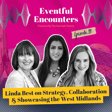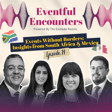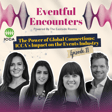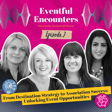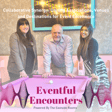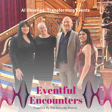Become a Creator today!Start creating today - Share your story with the world!
Start for free
00:00:00
00:00:01

Geopolitics Decoded: Insights from The Hague
As associations worldwide grapple with a rapidly shifting political and economic landscape, new research from The Hague and Partners Convention Bureau in collaboration with the European Society of Association Executives offers a vital snapshot of the challenges ahead. Discussed in-depth here on Eventful Encounters, Head of the Convention Bureau, Bas Schot laid out not only the concerning findings but also how destinations and venues can offer solutions.
Transcript
00:00:00
Speaker
Hello and welcome to Eventful Encounters, broadcasting live from IMAX Frankfurt 2025. We're your hosts, I'm Tanita. And I'm Leanne, and today's episode is one you'll want to lean into, especially if you're in the association, non-profit or policy space.
00:00:14
Speaker
That's right, we're diving into some really fresh research, just released by the Hague and Partners Convention Bureau in collaboration with the European Society of Association Executives, and the findings are really interesting.
00:00:27
Speaker
Yep, so joining us is someone right at the heart of the conversation, bas head of The Hagen Partners Convention Bureau. So, Baz, welcome to Eventful Encounters. Would i like to introduce yourself to us?
00:00:38
Speaker
Thank you. You're welcome. Yeah, my name is Baz Schott, head of Convention Bureau at The Partners. um Yeah, and together with Adam from Soring Worldwide, we have conducted this research paper, which you just mentioned about in the, and the soul i actually noticed in the press release, press conference this morning.
00:00:56
Speaker
Absolutely, it's half the press. So let's jump right in. Your team's new research reveals that a staggering 88% of associations believe that geopolitical instability is going to impact their operations and 85% say it already has.
00:01:10
Speaker
What was your reaction when you first saw those numbers? Because they are they huge. It is huge but not surprising because I think it's what what's happening in today's world is that it affects everyone, even in your day-to-day, in your personal life might maybe.
00:01:24
Speaker
especially in the business world. So I was not surprised about the high number. Moreover, it was a surprise that it shows that many, many associations are struggling with this topic. and and And that was a surprise to me. That there isnt is effect to them so yeah that is has an effect that sometimes you won't notice or see things you you don't believe there are. so so It's most surprising to see that that number also showed confidence that there is there is an urge to to yeah to change things now or to adapt to the changes.
00:02:03
Speaker
And it's not just perception, it's also preparedness. So only 13% feel well prepared to face these changes. So that's a major gap. So what does that tell us about where associations are today?
00:02:16
Speaker
Yeah, that's a good one. I can't speak for them totally because I rely on these numbers, but I was but i was a little bit concerned that there is there is a gap, there is a serious knowledge gap here.
00:02:28
Speaker
And I think that with that fact, we should see if we could assist in and help those associations. And that's not only we as convention bureaus, but also as stakeholders, as venues, and any other stakeholders involved.
00:02:45
Speaker
and organising an event for those associations. So I think that's that's the alarm which was raised by that number. The rise of popular populism came through as another big concern with 77% of respondents saying it's impacting their organisations.
00:03:00
Speaker
Can you unpack that a little bit for us? um yeah had There are some some examples of conferences recently yeah being shifted or moved or cancelled.
00:03:15
Speaker
That's what we heard even today this morning at the trade show I heard in in an example of of an association we had to move out to the southern country because of the fact that the effect of the populism, which is, I think, we should, one step first, step what's the effect of this high number higher number of of populism and the effect of that, that's that's that's the biggest concern and that's that has an impact on associations with maybe a DUI policy.
00:03:43
Speaker
yeah And that's what we see now with with some shifts and cancellations. Of course there might be also some shifts in in in the early stages already because of your region where you host your meeting is close to a war zone or another effect or a natural disaster. So there are many things But that's part of the the fact that that populism is is that such a big concern has an effect on mostly on the DUI measures that has been taken, for example, by the North Americans, by the USA, actually.
00:04:18
Speaker
Not all the North Americans, but the USA, sorry. Yeah. Okay. So what found interesting was how associations are responding. So the data shows that 81% are doubling down on their core mission and values.
00:04:32
Speaker
63% are strengthening their governance and 61% are working toward more diverse board representation. that feels like a clear push for integrity and long-term thinking.
00:04:44
Speaker
Yeah, that's that's that was a very interesting number. um Actually, it refers a little bit to my but what I said earlier, is that you see that associations are changing in that perspective or need to adapt yeah to those consequences of those, yeah let's say, more moreover high rates in populism and the the concern about that.
00:05:08
Speaker
So what we see, no, no, not what we see because these are the the fact-based numbers from the survey and I don't have all the detail at hand specifically, but yeah, it shows a big concern. And I think, and and not only the concern, but also, the f yeah, we've seen truly through that number that there is an effect, that there is a change already happening.
00:05:31
Speaker
Another point that stood out was 83% of leaders believe past crises like COVID-19 or the numerous financial crashes have helped and 42% say they still have major knowledge gaps.
00:05:43
Speaker
Where do you think that those gaps are most visible? I think the gap because of the fact that not everything can be related to COVID or the experience of COVID. I think we relate too much to COVID at the moment.
00:05:55
Speaker
No, no, no, but the the study showed that they have been learned learned from COVID-19, so not everything can be learned from that situation. It was such a unique situation. It was unique. It was impacted the events industry massively in live events.
00:06:13
Speaker
Massively. So not everything can be can be taken forward from that. so the the knowledge gap of the 42% you mentioned is this also about other things which is also unique, which is new to us in this situation in the world.
00:06:29
Speaker
I think if I speak not only for myself, that everyone at the table are and mostly here in in in in this trade show, don't know what's going to happen next and the day after. There's so much uncertainty and so many disruptive decisions being made right now, which has a huge impact and influence on on social society and and in the business world.
00:06:52
Speaker
I think that that's the knowledge gap we're still looking at. What is next and are we going anticipate to that? yeah And that's what struggles especially with the associations, of course. Yeah, there's been lots of learnings from the past, but yeah, exactly that. The world is changing so fast and at such quick pace that you're almost kind of catching up each morning to find out what's happened next and how the world's going to respond.
00:07:13
Speaker
So from a mobility perspective now, the research shows that 28% of the organisations have already moved events to more politically stable destinations, even though just 27% say that Europe is currently too unstable.
00:07:31
Speaker
So is this the beginning of a broader trend, do you think? Or Do you think that this is perhaps see who the research was sent out to? people that Now first of all, I was not completely shocked, but it is a high number. If you if you think that's almost one third of all the associations because you're are or are considering to to to move to a more different political stable region, yeah um then the first question which I also mentioned and addressed in this morning's press conferences
00:08:06
Speaker
What are political stable countries and regions then? The shift in that is is rapidly changing, I think, overnight. one One day you could be and one other day you're maybe not. yeah um So that's again the uncertainty, of course, but I think you can work on that to make happen that you are a political stable country or that that you can influence that somehow or even at least but position yourself as as a CVB and make that open.
00:08:33
Speaker
and clear transparent to everyone that you are. But to foster your For follow up on your question, I mean, I think that the 27% of the events that's that's migrating is he's also an alarming number. yeah um Because I feel that we, yeah, my first my my first thoughts were like, are we gonna anticipate to that? What is the change? What do we need to do as as destinations, but also maybe as venues? yeah
00:09:06
Speaker
or are any other stakeholders involved in this process? That's something I don't have the answer yet. I was going say, have you got a crystal ball? Yeah, I would have, then I would not have this conversation probably.
00:09:20
Speaker
It's difficult to predict, isn't it? I think it's just about staying to date with how the world is progressing and how we can kind of adapt as different venues or different destinations. and make sure that we um continue to attract the right events into our regions.
00:09:38
Speaker
yes So this research is part one but you told us this morning that there's more to come. Can you share a little bit about that? Yeah, now of course this was only in a highlighted summary of of of yeah of the facts but from from the survey. There's a lot more data to investigate. We are already doing at the time as we speak and we want to compile complete white paper report.
00:10:02
Speaker
where we can highlight more of those data out of that report, other than what was already communicated to you. um Hopefully we can deliver that in a very soon time, ah near time.
00:10:15
Speaker
But yeah, you could could think that there could be topics also addressed on on digital safety, but what's the effects of of digital wars affecting the industry but also the association market but if you have a membership platform what is the effect on that how will you mitigate whenever you have you know technical issues in the in the tech world but also financially also so there's a lot of changes and it will have also a financial impact what are other components other than what was mentioned
00:10:50
Speaker
illustrating that there is an impact on the geopolitical situation in the world which is rapidly changing as we speak of course so yeah there will be more clear insights on that.
00:11:02
Speaker
So um this research has given us a real window into what's keeping the association leaders up at night but also what's giving them hope so Baz for the professionals listening who are leading in this uncertain world what's your message to them?
00:11:16
Speaker
Listen clearly, look around and at a depth the situation adapt to the situation rather than jumping in front of and collide with the the solution or does the situation rather than that you should find the solution and that's the best thing and the thing to see if you can adapt to the situation, ah adapt to the change. yeah and We don't know yet if the change is structural or incidentally right now based on all of what's happening.
00:11:46
Speaker
But if you're not being seen in the capacity to change then and you yeah yeah you're where it holds with whatever the future is. think it was a good summary.
00:11:58
Speaker
And for destinations venues, what role can there help in but well they play in helping associations navigate this? Yeah, what I said it before is that if we want to have more stakeholders aligned to solve, let's say, the issue at the table, then transparency is the first thing to do. yeah Open up how you want to deal, how you want to secure your business.
00:12:22
Speaker
It's helping also associations to get to a faster decision. And I think by opening up also transparency is that you will see that how you can strengthen each other and cooperate with each other more more better rather than everyone's focusing on his own narrative.
00:12:42
Speaker
Yeah. which is then maybe also struggling and and ending up in a kind of a maze where you don't know how to deal with it. So, associations need that clarity.
00:12:52
Speaker
We as a venue, you as a venue, and we as a CFB, we all need clarity. We want to know up front where it leads us to. So, if you're being up front, but this is how we deal with this, then I think that would help anyone in this situation.
00:13:06
Speaker
I agree. Clarity is definitely key. So, Baz, thank you so much for sharing these insights with us and congratulations on what's clearly defined as a piece ah vital piece of research for from our industry. I think there's lots of insights in there.
00:13:21
Speaker
As ever, to step date with all things Eventful Encounters, follow us on Instagram, LinkedIn and Facebook and keep an eye out for the upcoming white paper from the Hague and Partners. That's it for this episode of Eventful Encounters.
00:13:32
Speaker
We'll see you next time right here from the heart of the global events community. Thank you, Baz. Thank you. Bye.
